What is Our Intensive Outpatient Program
Our Intensive Outpatient Program (IOP) is designed for individuals seeking a structured therapy environment while maintaining their daily responsibilities like work, school, or family commitments. This program serves as a critical step down from inpatient treatment or as a robust entry point for those requiring more support than traditional outpatient care can offer.
At its core, our IOP focuses on providing participants with the tools and strategies needed to navigate recovery in real-world scenarios. Through a combination of group therapy, individual counseling, and educational workshops, participants engage in a comprehensive treatment experience that addresses the physical, emotional, and psychological aspects of addiction.
Key components include relapse prevention techniques, coping mechanism development, and holistic wellness practices aimed at fostering long-term sobriety. Our dedicated team of therapists and counselors tailors these elements to meet the unique needs of each participant, ensuring a personalized approach to recovery.
How Intensive Outpatient Programs Help Substance Use
Intensive Outpatient Programs (IOP) offer a structured and supportive treatment option for individuals struggling with substance use. This type of program is designed to help people recover while they continue to live at home and maintain their daily responsibilities, such as work or school. One of the key benefits of IOP is its flexibility, which allows participants to integrate treatment into their everyday lives without the need for residential care.
Through a combination of group therapy, individual counseling, and educational sessions about substance use and mental health, IOP provides comprehensive support that addresses not just the physical aspects of addiction but also the psychological factors contributing to substance use. This dual focus helps individuals develop coping strategies for dealing with stressors and triggers in healthy ways, reducing the likelihood of relapse.
Moreover, Intensive Outpatient Programs foster a sense of community among participants. By sharing experiences and challenges with others who are facing similar struggles, individuals in IOP can build a network of support that extends beyond the program itself. This peer support is crucial for long-term recovery as it offers encouragement and accountability from those who truly understand the journey.
How Intensive Outpatient Program Helps Mental Health
Intensive Outpatient Programs (IOPs) offer a structured therapy option that allows individuals to receive treatment for mental health issues without the need for a residential stay. These programs are particularly beneficial because they provide a balanced approach to care, blending rigorous therapeutic sessions with the flexibility of living at home or in a supportive community setting. This enables participants to maintain their daily commitments to work, school, or family while still focusing on their mental health recovery.
One of the key ways IOPs help improve mental health is through regular, intensive therapy sessions. These sessions often include both individual and group therapy, allowing individuals to explore personal issues in depth while also benefiting from peer support and shared experiences. This combination can be incredibly powerful, offering insights and breakthroughs that might not be as accessible in traditional outpatient settings.
Moreover, IOPs typically employ a multidisciplinary approach to treatment. This means that participants may have access to psychiatrists, psychologists, counselors, social workers, and other specialists who work together to create a comprehensive treatment plan tailored to the individual’s needs. Such an approach ensures that various aspects of a person’s mental health are addressed—from psychological disorders like anxiety and depression to substance use disorders that may co-occur.
FAQ
We've compiled a list of frequently asked questions to provide clarity on the experience and alleviate any remaining fears or anxieties you might have.
A typical day in addiction rehab involves a structured and supportive environment aimed at promoting physical, mental, and emotional healing. Residents typically wake up early for a healthy breakfast before starting their daily schedule of therapy sessions, group activities, and workshops that address the root causes of their addiction. These may include individual counseling, group therapy, family therapy, exercise classes, educational lectures, and recreational activities. The day is also filled with nutritious meals, breaks for reflection and relaxation, and time for personal reflection through journaling or meditation. In the evening, there may be peer support meetings or 12-step programs to participate in before turning in for the night. Each day at our facilities is carefully planned to provide a well-rounded approach to recovery and help individuals establish healthy habits and coping mechanisms.
Typically, a detox period lasts around five days, though it can span from three to 10 days. The duration of detox is individualized, influenced by factors like the substances used, amounts consumed, duration of use, frequency, and method of administration. These factors collectively determine the necessary length of stay for you or your loved one.
Upon entering addiction treatment, there are certain items that are allowed and encouraged to bring for your comfort and well-being. These may include comfortable and appropriate clothing, personal hygiene products, prescription medications (with proper documentation), and journals or books for personal reflection. However, there are also items that are not allowed in addiction treatment facilities. These typically include any substances, such as drugs or alcohol, as well as weapons and anything that may be considered a distraction from the recovery process. Checking with the facility we've chosen in advance for a detailed list of permitted and banned items is crucial to ensure a seamless transition into treatment.
With Drug Abuse and Addiction, we understand that addiction is often closely tied to mental health issues. That's why our centers for drug abuse and addiction also prioritize addressing underlying mental health concerns. Our team of professionals is equipped to provide support and treatment for a variety of mental health disorders, such as depression, anxiety, PTSD, and more. We believe in a holistic approach to recovery, and this includes addressing both physical and mental health needs. Our admissions team is dedicated to finding the right facility that can offer comprehensive care for all your needs, ensuring a successful recovery journey. We are here to support you every step of the way towards lasting sobriety and improved mental well-being.
Our admissions team at Drug Abuse and Addiction is dedicated to helping you discover the ideal treatment center for your requirements. Selecting a rehab center can be daunting, which is why our team is here. We are committed to assisting you in navigating the process and locating the perfect center for you or your loved one. Comprised of caring and knowledgeable professionals, our admissions team comprehends the intricacies of addiction and the significance of selecting the appropriate treatment. We consider your unique needs, preferences, and any co-occurring conditions to match you with a facility that provides tailored care. You do not have to face this alone – our admissions team is committed to aiding you at every stage toward a successful recovery.
Watching a loved one struggle with addiction can be heartbreaking and overwhelming. You may feel helpless and unsure of how to help them. The first step towards getting your loved one the help they need is to have an open and honest conversation with them about their addiction. Express your concern and offer your support, but also set boundaries and encourage them to seek professional help. It may also be helpful to research treatment options with our team and have resources readily available for your loved one.
Remember to remain patient, understanding, and supportive throughout this process – recovery is a journey and it will take time. With the right approach and support, you can help your loved one find the path to a healthier and happier life free from addiction. So don't hesitate to reach out for guidance and support from our team at Drug Abuse and Addiction. We are here to help you and your loved one every step of the way towards recovery.
No matter how dedicated you are to your recovery journey or how determined you are to maintain sobriety for life, there's a possibility of relapse at some stage. Statistics from the National Institute on Drug Abuse indicate relapse rates during recovery range from 40% to 60%. Post-relapse, it's common to feel shame or remorse. You might even contemplate surrendering to addiction rather than persevering to combat the urge to use. While these feelings are normal, they can pose obstacles to achieving a drug-free life. Instead, view a relapse as a learning opportunity; refine your relapse prevention strategy and identify triggers. By delving into the underlying reasons for the relapse, you'll establish a foundation for a recovery that ensures you come back even stronger.
The initial step involves assessing whether revisiting rehab is necessary. If it was an isolated occurrence and you're dedicated to evaluating or adjusting your recovery plan, returning to an inpatient facility may not be essential. This setting provides the patient with hands-on care and ongoing monitoring. However, falling back into a persistent pattern of substance misuse may indicate the need for reentry into a structured treatment regimen. If conversations about substance use arise, socializing with individuals who encourage drinking, or using substances as a coping mechanism resurface, it signals a more significant issue requiring prompt intervention.
Upon reentering treatment post-relapse, the primary focus should be on reintegrating into daily life. Opting for a sober living environment for a few months post-treatment could be the most effective means to prevent relapse, as accountability and structure aid during the initial vulnerable phase. Additionally, having an outpatient therapy plan in place for ongoing support post-rehab is beneficial.
How to get started
We strive to make our services as accessible and affordable as possible. We are proud to say that we accept most major insurance plans, allowing you to utilize your mental health benefits and receive quality care without breaking the bank.
Verify Benefits
CONSULTATION
Schedule a FREE 30 minute CONSULTATION where you can have a chance to meet with a counselor to find out your treatment needs and tour our facility.

EVALUATION
Schedule and complete a drug & alcohol EVALUATION to determine your level of care and appropriate treatment placement.

INTAKE
Schedule an INTAKE appointment once you have received the results from your assessment and begin your treatment program.

Verify Your Insurance With Us
Freeing yourself from Addiction doesn't have to be hard. Take the first Step and begin filling out the form, it's the initial phase in achieving a healthy recovery. We offer the necessary guidance and professional care crucial during the early treatment stages.














